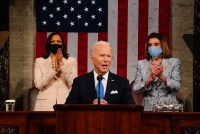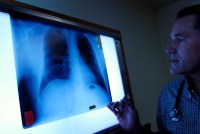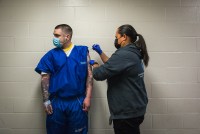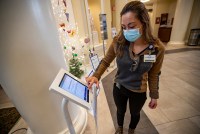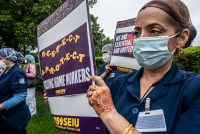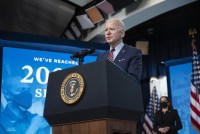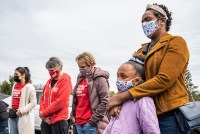Latest KFF Health News Stories
KHN’s ‘What the Health?’: 100 Days of Health Policy
It’s 100 days into Joe Biden’s presidency and a surprisingly large number of health policies have been announced. But health is notably absent from the administration’s $1.8 trillion spending plan for American families, making it unclear how much more will get done this year. Meanwhile, the Centers for Disease Control and Prevention loosens its mask-wearing recommendations for those who have been vaccinated, but the new rules are confusing. Joanne Kenen of Politico, Mary Ellen McIntire of CQ Roll Call and Sarah Karlin-Smith of the Pink Sheet join KHN’s Julie Rovner to discuss these issues and more. Plus, Rovner interviews KHN’s Julie Appleby, who reported the latest KHN-NPR “Bill of the Month” episode.
A ‘Dose of Hope’? Fact-Checking President Joe Biden’s First Speech to Congress
In his first speech before a joint session of Congress, President Joe Biden argued it was time to turn the coronavirus pandemic into a historic opportunity to expand government for the benefit of a wider range of Americans, urging investments in jobs, climate change, child care, infrastructure and more.
In Poisoned Montana Town, Warren Buffett-Owned Railroad Accuses Clinic of Medicare Fraud
BNSF Railway accuses the Center for Asbestos Related Disease of Medicare fraud by misdiagnosing and overtreating asbestos-caused illnesses, which the health clinic calls a cynical attempt by the company to limit its own liability.
Covid Forces Cohousing Communities to Examine Shared Values and Relationships
How do dozens of people living communally decide what to do during a public health crisis when members have varying tolerance for risk and different opinions about safe practices?
Some County Jail Inmates See Vaccination as Ticket to a Better Life — In the State Pen
In the Los Angeles County Jail system, many inmates hope being vaccinated will get them transferred more quickly to state prison. Some just want to protect themselves against covid, while others are distrustful and refuse vaccination.
What a Difference a Year Makes in Colorado’s Case for a Public Option Plan
Before the pandemic, Colorado was building momentum to pass what’s known as a “public option” health plan that would lower insurance premiums and force hospitals to accept lower payments. But now with hospitals and health care providers enjoying support as front-line heroes in the pandemic, state legislators have stripped the option from their bill.
No hay que sufrir efectos secundarios con la vacuna contra covid para estar protegido
Si bien los síntomas muestran que el sistema inmune está respondiendo a la vacuna y que protegerá contra la enfermedad, las personas con pocos o ningún síntoma también estaban protegidas.
You Don’t Have to Suffer to Benefit From Covid Vaccination — But Some Prefer It
In the times of smallpox, vaccination was accompanied by blood, sweat, fire and brimstone. Nowadays, a slight fever may make you feel as if you’ve earned the reward of immunity from covid. But you’re protected even without a nasty reaction to the vaccine.
Doctors More Likely to Prescribe Opioids to Covid ‘Long Haulers,’ Raising Addiction Fears
Chronic pain from covid can linger for months after patients appear to recover from the disease.
Ohio’s Amish Suffered a Lot From Covid, but Vaccines Are Still a Hard Sell
Despite high mortality and infection rates, the counties of northeastern Ohio, where many Amish people live, have the lowest vaccination rates in the state.
Watch: What Happens When Car and Health Insurance Collide
KHN Editor-in-Chief Dr. Elisabeth Rosenthal helps accident victims avoid pitfalls in seeking medical care — a conundrum profiled in KHN-NPR’s most recent Bill of the Month installment.
La pandemia ha puesto más en peligro a los que no hablan inglés
Al comienzo de la pandemia, médicos del Brigham and Women Hospital observaron lo que se sería una siniestra estadística: los pacientes que sabían poco o nada de inglés tenían un 35% más de posibilidades de morir.
Big Investors Push Nursing Homes to Upgrade Care and Working Conditions
Responsible for 34% of the nation’s covid death toll, nursing homes and long-term care facilities get slammed by their investors and are told to change.
Pandemic Imperiled Non-English Speakers More Than Others
Covid patients who did not speak English well were 35% more likely to die, data from one Boston hospital shows.
Evaluating President Joe Biden’s First 100 Days in Office
Presidential historians say that Joe Biden’s first 100 days in office — a somewhat arbitrary but frequently cited milestone — have included an above-average number of major accomplishments.
Time to Say Goodbye to Some Insurers’ Waivers for Covid Treatment Fees
Insurers voluntarily set the charges aside earlier in the pandemic — but that means those same health plans can decide to reinstate them.
‘Red Flag’ Gun Laws Get Another Look After Indiana, Colorado Shootings
It’s unclear whether “red flag” laws — which allow the seizure of guns from a person deemed dangerous — help prevent mass shootings or should have been applied to the suspects in recent shootings in Boulder, Colorado, and Indianapolis.
‘We’re Coming for You’: For Public Health Officials, a Year of Threats and Menace
Local health officials have become the face of government authority as they work to stem the pandemic. That has made them targets for chilling threats from some of the same militia groups that stormed the U.S. Capitol. Santa Cruz leaders are among those whose daily routines now incorporate security patrols, surveillance cameras and, in some cases, firearms.
From Hospital Profits to Gender Gaps, Journalists Are on the Case
KHN and California Healthline staff made the rounds on national and local media this week to discuss their stories. Here’s a collection of their appearances.
Virtual Care Spreads in Missouri Health System, Home to ‘Hospital Without Beds’
In 2015, St. Louis-based Mercy health system opened what officials called the world’s first “hospital without beds.” Since the pandemic, Mercy has incorporated telehealth throughout its system, part of a national acceleration in virtual care that proponents laud but critics say is happening too fast.




